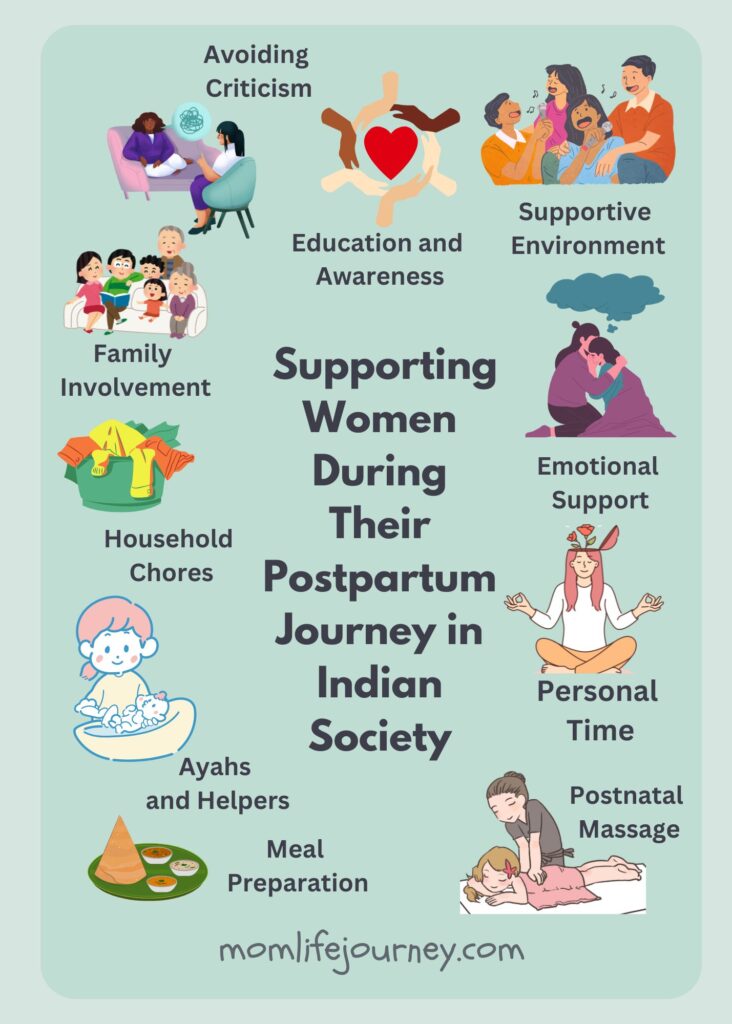
The arrival of a new baby is an immensely joyful event, yet it also brings significant changes and challenges, especially for new mothers. The postpartum period, often termed the “fourth trimester,” is a critical phase where a mother undergoes physical recovery, emotional adjustments, and learns to care for her newborn. In the context of Indian society, with its rich cultural tapestry and strong family bonds, there are unique opportunities and responsibilities to support women during this delicate time. Here’s how Indian society can step up to provide the necessary care and compassion for new mothers.
Strengthening Emotional Support Networks
Emotional support is paramount during the postpartum period. New mothers often experience a rollercoaster of emotions, from joy and love to anxiety and sadness. Indian society can harness its strong familial bonds to provide this crucial support.
Family Involvement:
The joint family system, still prevalent in many parts of India, can be a tremendous source of emotional support. Family members can take turns to stay with the new mother, offering her companionship and a listening ear.
Community Support:
Involving community members, such as neighbors and friends, can create a broader support network. Regular visits and check-ins can help new mothers feel less isolated.
Providing Practical Assistance
Practical support can significantly alleviate the burden on new mothers. Indian society, with its community-centric approach, is well-placed to offer such assistance.
Household Chores:
Family members, particularly mothers-in-law or elder sisters, can take over household chores like cooking, cleaning, and laundry, allowing the new mother to focus on her recovery and the baby.
Ayahs and Helpers:
In many Indian households, employing an ayah or helper to manage daily chores can ease the load. This tradition can be particularly beneficial during the postpartum period.
Meal Preparation:
Preparing nutritious meals, tailored to aid postpartum recovery, is a common practice. Traditional foods like gond ke laddu, panjiri, and other healing foods can support the mother’s recovery process.
Assisting with Baby Care
Caring for a newborn is demanding. Indian society can play a pivotal role in sharing this responsibility.
Baby Care by Elders:
Grandparents and other family members can assist with baby care tasks such as bathing, massaging, and putting the baby to sleep. Their experience and wisdom can be invaluable.
Night-time Assistance:
In many Indian families, it’s common for elders to take turns caring for the baby at night, allowing the mother to rest and recover.
Encouraging Self-Care
Self-care is often overlooked during the postpartum period, but it is crucial for a mother’s well-being. Indian society can promote and facilitate self-care practices for new mothers.
Postnatal Massage:
Traditional postnatal massages, often performed by experienced masseuses, can help new mothers relax and recover physically.
Rest :
Encouraging the new mother to rest and take naps when the baby sleeps is essential. Family members can help by managing household tasks and baby care during these times.
Personal Time:
Providing opportunities for the mother to engage in activities she enjoys, such as reading, listening to music, or practicing yoga, can enhance her mental well-being.
Education and Awareness
Educating oneself about the postpartum period can enhance the quality of support provided to new mothers. Indian society can benefit from greater awareness and understanding of postpartum needs.
Understanding Postpartum Recovery:
Learning about the physical and emotional changes that occur after childbirth can foster empathy and appropriate responses.
Recognizing Postpartum Depression:
Awareness of the signs and symptoms of postpartum depression and anxiety is crucial. Early recognition and intervention can make a significant difference.
Promoting Patience and Understanding
The postpartum period is filled with unpredictability and challenges. Indian society can cultivate a culture of patience and understanding towards new mothers.
Avoiding Criticism:
Refraining from criticizing a new mother’s parenting choices or appearance is important. Instead, offering positive reinforcement and encouragement can boost her confidence.
Being Flexible:
Plans may change frequently due to the baby’s needs. Being flexible and accommodating these changes can reduce stress for the mother.